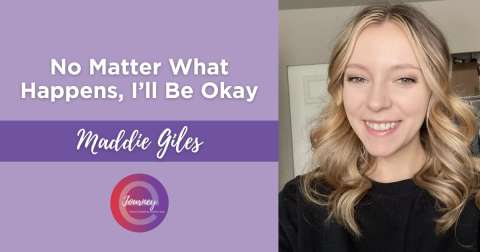No Matter What Happens, I’ll Be Okay

By Maddie Giles , Washington
Person with EpilepsyTuesday, March 5, 2024
In 2011, I had my first tonic-clonic seizure. I remember having muscle spasms that morning and feeling so out of touch. I couldn't tell what was real; my vision distorted, and my arms jerked. I couldn't hold a conversation or comprehend what people were saying. I had no idea what was happening or why. Then everything went dark. I didn't gain full awareness until maybe an hour later in the hospital emergency room. A few tests later, I was diagnosed with juvenile myoclonic epilepsy (JME).
I've had to overcome many mental challenges. I've struggled with anxiety, depression, and panic disorder since my diagnosis. Health anxiety is tricky with epilepsy because you can't predict when and where seizures will happen, so you feel on edge 24/7.
Luckily, I've built a pretty great stress-reducing toolkit over the years. I ensure I take my meds on time and get at least seven hours of sleep every night. I don't drink alcohol, limit caffeine, exercise regularly, and do my best to have a positive mindset. I tried weaning off medication in 2013, and I had another tonic-clonic seizure. Since then, I have had a handful of smaller breakthrough seizures, but overall, anti-seizure medication has kept me seizure-free.
The mantra keeps me going: "No matter what happens, I'll be okay." I've had to quit jobs, lose my driving privileges, miss out on social gatherings with friends, deal with stigma, and overcome mental health struggles. It can feel impossible to trust that you'll be okay no matter what, but there is comfort once you find that trust and acceptance. I'm still here, I'm okay, and I know I will be okay. Bad days eventually turn into good ones!
Reviewed By: Sara Wyen
